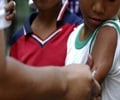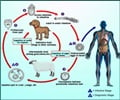New research has indicated that a sudden, serious allergic reaction—known anaphylaxis or anaphylactic shock— following vaccination, is extremely rare.

But because anaphylaxis is rare, it is usually very difficult to pick this up as a potential side effect of a new treatment during clinical trials. Manufacturers have to rely on data collected after the product has come to market.
The authors base their findings on children under the age of 16 in the UK and Ireland, who were suspected of having experienced anaphylaxis after being vaccinated between 2008 and 2009.
All the cases came from specialists, who were asked to report on any child they treated with suspected or actual anaphylaxis following a vaccination during this period to the British Paediatric Surveillance Unit.
During this time, 15 cases were reported following vaccination with the single measles jab; the HPV jab which is used to protect against cervical cancer; two types of vaccine for meningitis; a hepatitis A vaccine; typhoid vaccine; and a school leaver's booster jab (probably tetanus/polio).
Only seven of these cases were confirmed as anaphylaxis. Six children required an injection of adrenaline and intravenous fluids. All made a full recovery; one child recovered without treatment.
Advertisement
Two of the cases were associated with the single component measles vaccine. As more than 16,000 doses were imported over the study period, this gives an incidence of 12 cases of anaphylaxis for every 100,000 doses, say the authors.
Advertisement
None of the cases were associated with the normal pre-school or infant immunisation schedule, including the triple MMR jab.
And around 5.5 million children would have received routine vaccinations during this period without any reported cases of anaphylaxis, say the authors.
"This is extremely reassuring data for the general public and healthcare workers alike," they conclude. "Despite its limitations, the small numbers of cases reported are likely to be a true estimate of anaphylaxis [following immunisation] rates."
Source-Eurekalert











